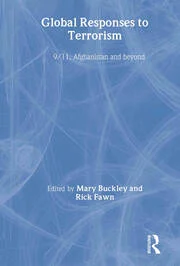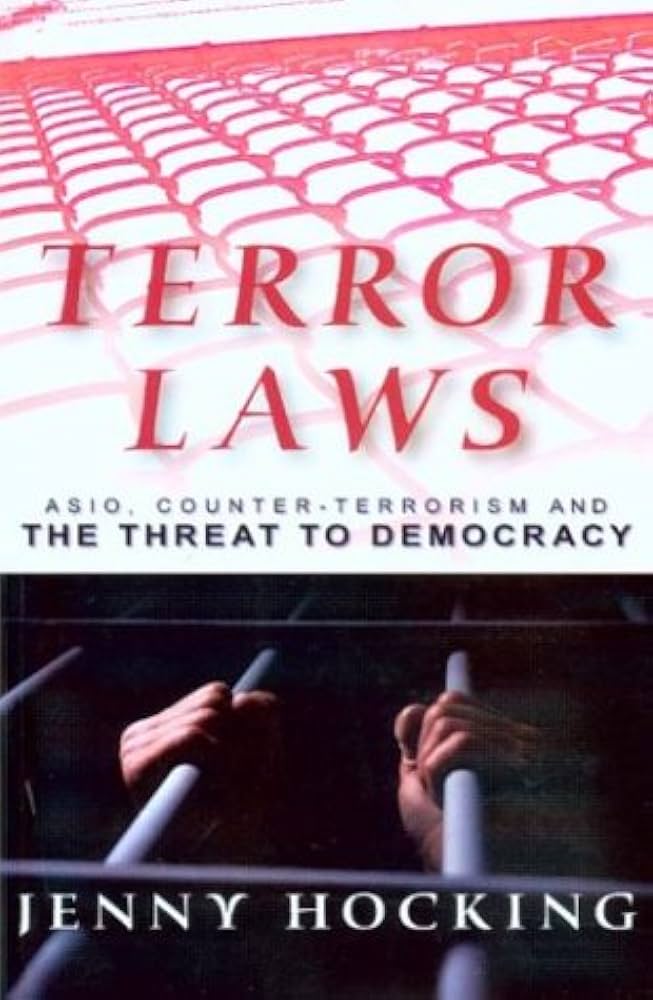- Free Article: No
- Contents Category: Politics
- Review Article: Yes
- Online Only: No
- Custom Highlight Text:
Does Australia need new laws against terrorism? In 1979 Mr Justice Windeyer of the NSW Supreme Court argued that all the forms of violent wrongdoing that are called terrorism are already punishable as crimes under Commonwealth or state law. The best safeguard against new terrors and apprehensions, he told the Hope Royal Commission on Australia’s Intelligence Agencies, lay in the rigorous enforcement of existing criminal law rather than in making new laws expressly about ‘terrorism’.
- Book 1 Title: Global Responses to Terrorism
- Book 1 Subtitle: 9/11, Afghanistan and beyond
- Book 1 Biblio: Routledge, $62 pb, 349 pp
- Book 1 Cover Small (400 x 600):

- Book 1 Cover (800 x 1200):

- Book 2 Title: Terror Laws
- Book 2 Subtitle: AISO, counter-terrorism and the threat to democracy
- Book 2 Biblio: UNSW Press, $34.95 pb, 300 pp
- Book 2 Cover Small (400 x 600):

- Book 2 Cover (800 x 1200):

Hocking’s book is relevant and timely. It sets out the context of the current rush to create new security legislation and to increase the power of military and police security forces against the history of Australian internal security organisations. It describes the creation of Australia’s first intelligence corps in 1907 and its disbandment in 1914; how a more extensive military intelligence apparatus grew throughout the Commonwealth during World War I, to be used by Billy Hughes for political surveillance during the 1917 conscription debate; how these agencies multiplied during World War II and began to track and arrest aliens; why Ben Chifley, under pressure from the US and British governments, created ASIO in 1949; how, under Robert Menzies, ASIO turned a blind eye towards the criminal activities of the Croatian Ustasha because they were anti-communist, but sedulously kept files on Labor politicians and union officials, a practice replicated at the time, and afterwards, in the special branches of most state police forces.
Hocking examines the findings of the Hope Royal Commission and of the White Inquiry ordered by Don Dunstan in South Australia, which led to the premier sacking his police commissioner, Harold Salisbury. She describes Malcolm Fraser’s decision to call out the military following the Hilton Hotel bombing in Sydney at the time of the 1978 Commonwealth Regional Heads of Government meeting. Although she cannot say who did it, Hocking describes the decision as a ludicrous overreaction to an unidentified threat, but one that created a legal distinction between violence in civil society and terrorism. This further weakened the good sense and relevance of Windeyer’s advice to the Hope Royal Commission, and led to the radical restructuring of ASIO in 1979 and to its further expansion by Bob Hawke in 1986.
All this Hocking describes as part of a ‘first wave’ of Australian security legislation, which tended to target marginalised, politically dissident domestic groups and individuals. She then describes a ‘second wave’, which followed the bombings in Washington, New York and Kuta. This is premised on the broader notion of globalised ‘terrorism’, and involves radical departures in policing, surveillance and judicial methods. The prime minister assumed direct control of counter-terrorism. A new National Counter Terrorism Committee reports directly to the Department of Prime Minister and Cabinet. The 2002 federal budget contained an extra billion dollars for counter-terrorist operations, with a projected budget increase of $23.5 billion over the next decade. A newly formed and equipped Special Air Services assault regiment is to be based in Sydney.
Five new bills. introduced into parliament on 12 March 2002. were designed, among other things, to grant ASIO the power to detain anyone, including children, for interrogation without charge, or the right to legal counsel, or the right to remain silent. New categories of terrorist offences were to be created, including treason. The attorney-general or a designated minister was to be given the power to ban any organisation, or label any organisation a ‘terrorist’ organisation, and to confiscate its property or funds, without appeal or redress.
Hocking convincingly argues that in many respects such bills would fundamentally subvert the rule of law. In particular. the Security Legislative Amendment (Terrorism) Act of 2002 fails to allow for trial, circumvents the notion of equality before the law in identifying groups to which usual judicial process does not apply, and breaches the separation of the legislature from the judicature by allowing non-judicial powers to criminalise organisations.
Her concern is reflected in the lengthy, confusing and acrimonious debates on the bills in parliament over the last two years, and in the separate deliberations of joint parliamentary and senate committees. The debates were marked by the Labour opposition’s compliance, amounting even to a lack of principle, and by the Greens’ consistently trenchant and hard-hitting criticism, particularly from Senator Bob Brown. The Senate’s delay in passing some of the bills now leaves Howard with several double dissolution triggers if he wants an early election.
Among the proposed legislation, the ASIO Legislation Amendment (Terrorism) Bill was passed, in June 2003, with minor amendments. The Law Institute of Victoria characterised what the government calls its improvements as ‘a cruel trick and illusory’. It allows Australian children from the age of sixteen years and adult non-suspects to be detained, potentially indefinitely, without legal advice. They may be interrogated with the coercive sanction of five years’ imprisonment for failing to provide information. Inevitably, more restrictive legislation will follow.
In contrast to Hocking’s depressing account to of the post September 11 and post-Bali Australian legal system, Mary Buckley and Rick Fawn’s Global Responses to Terrorism offers a somewhat less depressing perspective. The mainly British academic contributors give a tightly written, well-ordered account of how September 11 and Bush’s war on terror have affected the foreign and domestic policies of the US, selected countries in Europe and the Middle East, India, Pakistan, China and the Russian Federation. Its main shortcoming is that it was written prior to the illegal invasion of Iraq by the United States, Britain, and Australia, and so misses the almost universal condemnation that greeted that event. It does record the genuine international sympathy for the US that followed the bombing of the World Trade Centre, sympathy that began to sour only after George W. Bush delivered his ‘axis of evil’ speech on 29 January 2002. Most countries supported the US invasion of Afghanistan and regime change in Kabul because, unlike the invasion of Iraq, it was sanctioned by the UN.
Another shortcoming for a former Australian diplomat like me is that the book contains so little analysis of responses in Asia to US actions since September 11: nothing on Japan, South Korea or any country in Southeast Asia, apart from the Philippines. Australian foreign policy barely rates a mention, even as a military participant in Afghanistan. But there are insights about other countries. China, Russia and Israel are convincingly shown to have interpreted Washington’s get-tough policies towards international terrorism as an excuse to further repress their own minorities. (Some Israelis called September 11 a ‘Hanukkah Miracle’.)
President Gloria Macapagal Orroyo’s haste in offering support for the US alliance is seen as the action of a weak state, offering short-term gains for the Philippines but likely to aggravate the long-standing conflict with Islamic separatists in Mindanao. Pakistan, by being coerced into joining the US Coalition of the Willing, has been transformed from a failing state to a liberal Islamic régime, an important country with debt write-offs and a new lease of economic life. In Saudi Arabia, one of the countries least receptive to earlier US demands for cooperation, it is now recognised that serious structural and social reform is imperative to contain the radical religious right.
Fawn shows Canada to have been a reluctant middle power faced with three dilemmas. Should Canada assist the US in Afghanistan with troops, which would underscore its general lack of military preparedness? Could Canada’s ethos of multiculturalism and open immigration be protected in the face of charges that it aided terrorism? Would new concepts of an expanded North American ‘security perimeter’, devised by neo-cons in Washington, impinge on Canadian sovereignty, including the right to formulate its own immigration. defence and trade policies? On the first anniversary of September 11, Prime Minister Jean Chrétien voiced such dilemmas, along with some historical perspectives on why some actions of the US have unwittingly or otherwise stimulated international terror against it. It’s a pity that the Australian government, which usually shares many foreign policy perspectives with Canada, has shown no inclination to be as thoughtful.


Comments powered by CComment